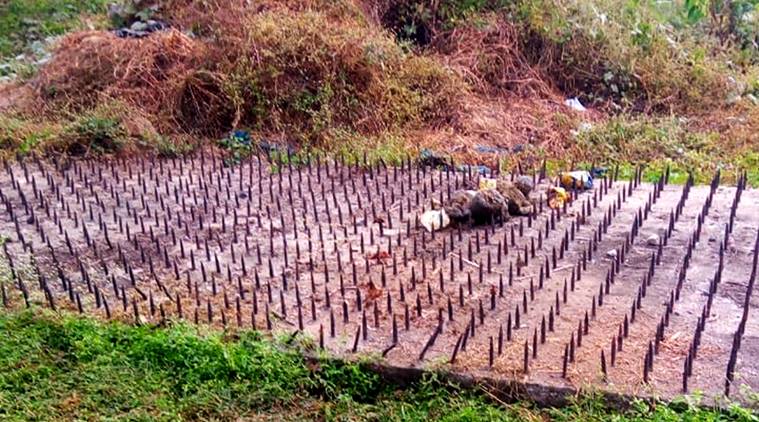Guwahati: ‘Metallic spikes’ put up by Army under radar after report of recent elephant death
The army has denied that the spikes killed any elephant but said that a recent order has been passed to remove it.
 The spikes have been placed outside the periphery of a major supply depot of the Army cantonment since 2003.
The spikes have been placed outside the periphery of a major supply depot of the Army cantonment since 2003.
A bed of six-inch-long metallic spikes — laid down by the Indian Army inside its cantonment in Guwahati which is adjacent to the Amchang Wildlife Sanctuary to prevent wild elephants from destroying food stock — has been established by forest officials to have killed one elephant this month.
The spikes, which have been placed outside the periphery of a major supply depot of the Army cantonment since 2003, have injured many and might have been the cause for the death of at least two other wild elephants in the area, according to the forest department officials. The army has denied that the spikes killed any elephant but said that a recent order has been passed to remove it.
“A male elephant of the Amchang wildlife sanctuary was found dead on March 4. As per veterinary doctor’s report, it died of septicaemia caused by a wound in the leg. The nature of the injury establishes that in all probability the wound was caused by the spikes inside the cantonment,” said Pradipta Baruah, DFO, Guwahati Wildlife division told The Indian Express.
The autopsy report of the elephant, accessed by this newspaper, described that the animal had “punctured wounds on its right hind leg and foreleg”. The elephant weighed 1500kg.
Dr BK Gogoi, a veterinarian with Assam’s Forest Department, told The Indian Express, “Circumstantially, it can be established that the wound was caused by the spikes. The spikes have been there for some time now. Multiple injury cases have been reported due to it.”
Cases of wild elephants coming into clashes with humans have been a routine affair in Assam over the decades and conservationists point out to reasons such as degradation of elephant habitats, infrastructure development, blocking of traditional elephant corridors and expansion of human settlements.
Assam government data shows at least 761 people were killed by elephants in Assam since 2010 while 249 elephants lost their lives due to non-natural reasons in the same period. Of the 249 elephants killed since 2010, 20 died due to poaching, 54 in train accidents, 91 due to electrocution, 38 in ‘accidental’ reasons, 30 due to poisoning and 15 due to injuries.
But the detrimental effects of the Army’s spikes is not news for forest officials. DFO Baruah had on December 27, 2018, written to the Colonel in-charge of administration at the Narengi Army Station, saying that at 2am on December 25 one elephant was injured as it stepped on the “pointed iron spikes”.
“This type of cruel effort to keep the elephants at bay is definitely going to defeat the very spirit of wildlife protection and preservation. You are, therefore, requested to do away with this type of detrimental measures… and evolve to take recourse to a more compassionate method in tandem with the wildlife division in the true spirits of protecting the wildlife,” Baruah wrote.
“The elephant injured on December 25 was treated by the forest department by putting medicine in bananas and putting them on the way through which the injured elephant moved,” Amchang’s Range officer Nareswar Das told The Indian Express.
After the report of the elephant’s injury on December 25, forest department officials and WWF members held a meeting with the army personnel in the cantonment and it was suggested to the army resorts to other means. But as of now, the spikes exist.
A Guwahati-based defence spokesperson told The Indian Express on Tuesday, “Directions have been received recently to remove the spikes. The measures suggested by the forest officials and WWF members have been disseminated to all involved.”
The spokesperson further added, “The spikes have been there since 2003. There was one report of an injury to an elephant in 2005. We have also dug ditches as a deterrent and used ultra-sonic buzzers to ward off elephants.”
Defence sources said that the depot stores crucial food stock, necessary for supply across the Northeastern region. The Army station in Narengi divides the first and second block of the wildlife sanctuary, and conservationists have pointed out that it falls within an elephant habitat.
Army officers residing in the cantonment said that five-six elephants often run amok within the premise of the camp but as of now there have been no major incidences of destruction. The depot is one of the major attractions for the wild elephants. Two forest department guards, aided by army personnel, keep vigil against elephants within the cantonment.
Assam’s forest department recently announced that they will soon be using drones and specially-equipped vehicles, called Airavat, fitted with tranquillising guns and GPS device, to tackle the man-elephant conflict.
The 2019-20 state budget, announced on February 6, has, among others, an allocation for new technological methods for wildlife and forest protection and management in the state — including the drones and the Airavat.



- 01
- 02
- 03
- 04
- 05




























